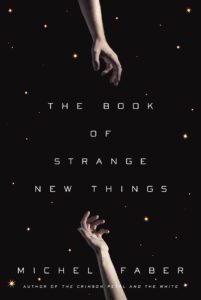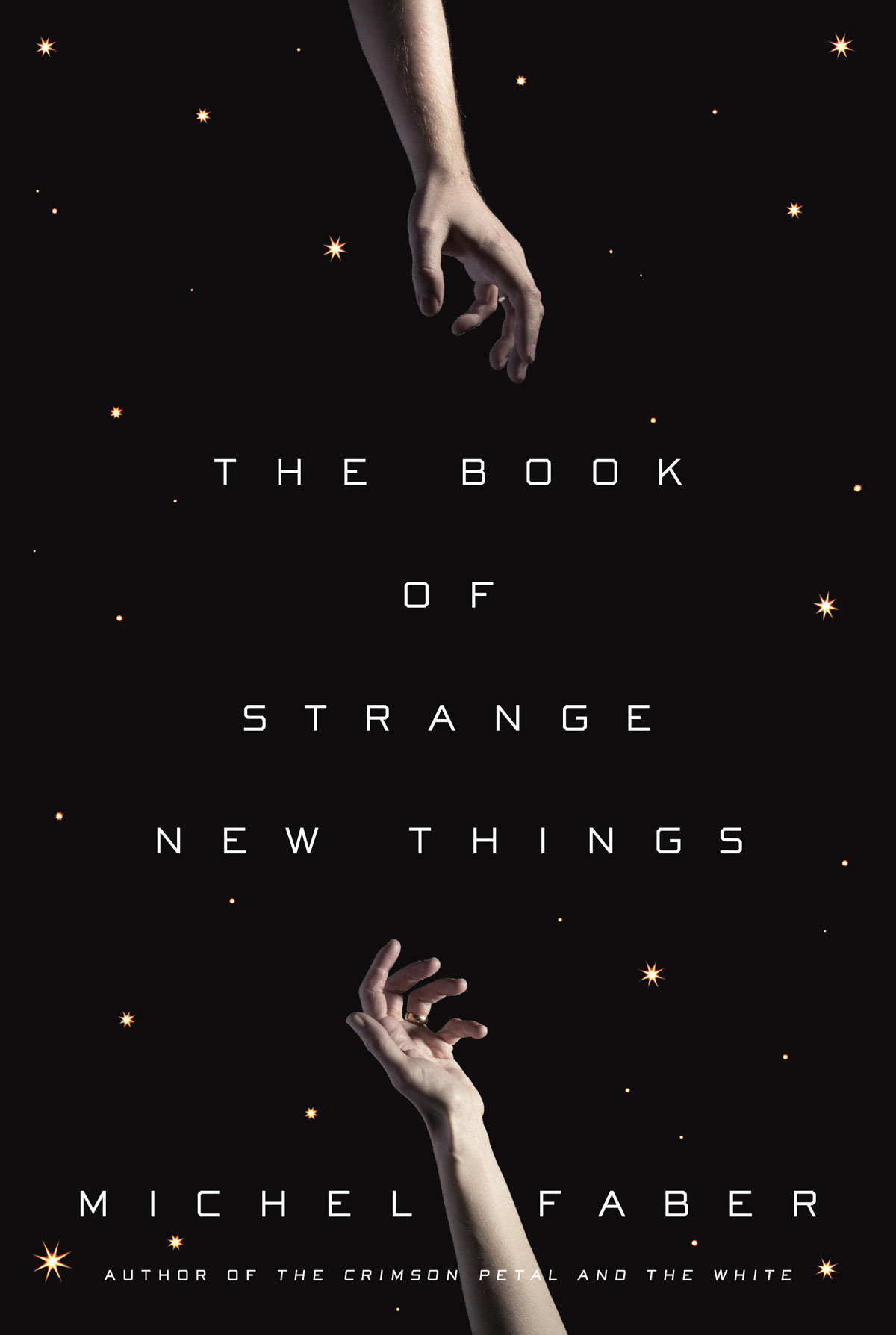
Author: Michel Faber
Publication Year: 2014
Length: 500 pages
The Book of Strange New Things is not only a mouthful, but is also almost impossible to describe without either sounding way too simplistic or entirely too detailed and spoiler-y. So, I’ll start by saying that this thing is basically a sci-fi narrative that, like most sci-fi narratives, isn’t really all that much about science, but is actually spiritual and, in this case, about unabashed and blind religious fealty. I think, if I had to compare it to anything I’ve read in the past (like the way past), it would be parts of Ray Bradbury’s The Martian Chronicles. Not in structure, mind you, but the kind of strange feeling of foreboding that pervades a story about Earthling colonists on a far-away planet that gradually become as much citizens of that planet as they did the one they came from. This one, though, is primarily focused on a single protagonist who has come to the planet, Oasis, to proselytize to the planet’s native population.
So, our protagonist, Peter, is a Christian preacher from England, who, it turns out, is a born-again dude who was once a drug addicted, drunk, homeless thief, but has gotten his life together, is married and has followed his calling to come to Oasis to be a missionary to a new race of aliens to spread the word of Jesus. His ticket and significant wages are paid by a large multi-national corporation that has set up a base on the planet and is apparently trying out the whole theory that people can live off planet (though it’s never really clear why they’re doing what they’re doing). It’s also never clear from the get go why exactly they need a preacher there, as none of his co-workers seem to care that he’s there, as they are a rather agnostic and work-focused bunch. Our initial thought is that there may be a dangerous bunch of blood-sucking aliens that need to be wrangled, but this turns out to be the opposite of the truth. There are aliens, but they are docile and very ready and willing to take on the word of the bible — which they call The Book of Strange New Things. They have been prepped by the former preacher to the “word,” but that preacher has disappeared and our guy, Peter, is his replacement. His co-workers, as he gets to know them, are all completely unattached with people back on Earth, unconcerned with the native population and honestly don’t seem to mind being isolated in this foreign land. The corporation’s psychological test, it seems, picked these unattached types on purpose, as they were the best suited to the environment. Peter, though, suffers as his communications with his wife (which is done via a rudimentary e-mail-like system) begin to break down and become more and more dire and convoluted. In his separation from his wife, and his choice to live among the Oasans for extended periods, he starts to question everything. And as the situation on Earth becomes more hectic and nobody around him, because of their separation from anyone on Earth, seems to have connection to his situation, he begins to unravel.
And this is what makes this book interesting. There is this cloud of dread that kind of hangs over the whole thing, but it’s never quite clear why. Yes, Peter’s wife’s world is falling apart, and his communication with his her, as she e-mails him, kind of keeps us abreast of that deteriorating situation, but the action with Peter never really — when you step back and look at it — amps up or reaches any kind of fever pitch to justify the feeling of impending doom that you just know is coming. Author, Michael Faber, also wrote Under the Skin, which also does this thing where you’re waiting for craziness to unfold, but just kind of grinds along and embeds in you this knowledge that something awful is going on, but you can’t quite nail down why you’re feeling the way you’re feeling.
At the heart of the book is religious belief, though I’m unclear what Faber’s feeling is about religion itself. The novel is full of religion and the philosophy and doctrine behind it. The majority of the characters are completely indifferent about it, dismissive, even. But Peter and his aboriginal following are die-hards. It’s clear why Peter feels about religion the way he does. It gave him his life back after a life full of mayhem, debauchery, selfishness and self-destruction. It’s less clear, though, why the Oasans are so into it. What is their motivation? Why are they so willing and malleable to Jesus’ teachings? Because the aliens don’t really have recognizable faces, wear formless robes and have a native language that can’t intelligently be spoken by humans, they even go by the name “Jesus Lover 1, 2, 3, etc.” It becomes their entire identity. But why?
There is a twist in this book, or, rather, a kind of revelation that I won’t give away, but it took me going back a couple pages a few times to really figure out exactly what it is. It’s that fulcrum that kind of tips Peter into one camp and changes the path his narrative. It honestly felt a little cheap after reading about 500 pages, but in retrospect, I can live with it because the rest of the book is thoughtfully done, well written and super-considered. I happen to like sci-fi, but I don’t think you necessarily need to be a fan of the genre in order to enjoy this book. It has so much humanity in it that it could have honestly been told on Earth in some other isolated, developing country and felt not all that different than it did. I imagine that was part of the idea here, but the themes are universal and the way it makes you think about it weeks afterward is pretty unique and pretty affecting in a way I didn’t think it would while I was actually reading it.


